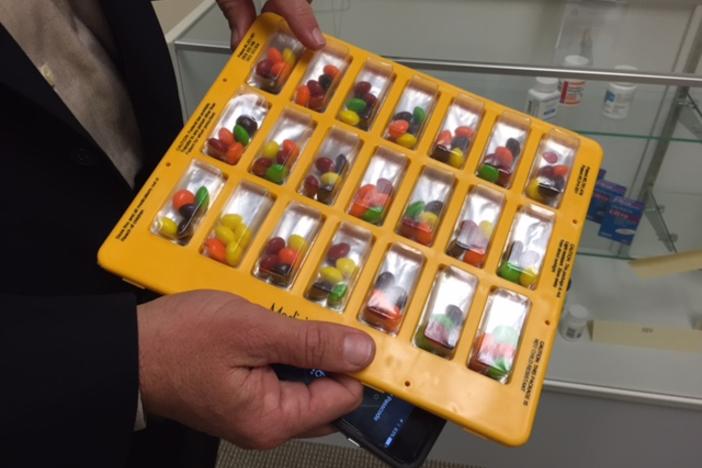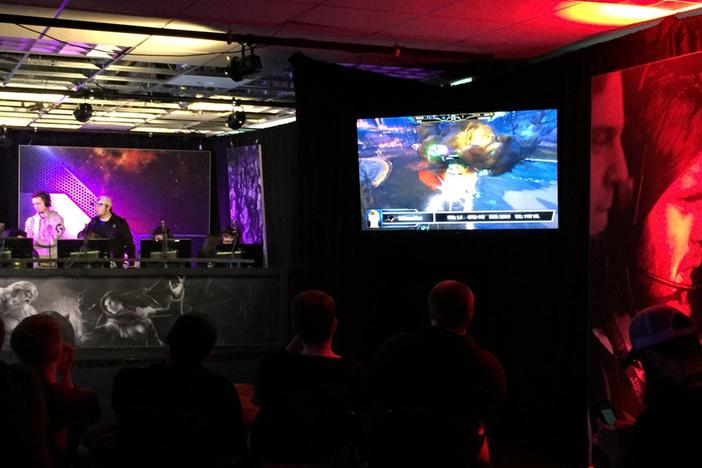
Section Branding
Header Content
Millennials May Not Bite On Apple Music
Primary Content

I won't know for sure until June 30, but it sure sounds like I'll end up singing the praises of the forthcoming Apple Music, the company's latest answer to Spotify and Pandora. But it may be too late for CEO Tim Cook and his company to overcome the listening habits of young people - or for that matter, anyone who is now used to getting their media for free from Spotify and Pandora.
Apple Music made its debut at the company's annual Worldwide Developer Conference in San Francisco on Monday. Even though a diversity-conscious Apple brought out its women executives for the first time on a WWDC stage to talk about the iOS9 and OSX operating systems, Cook unleashed a boy band to help introduce Apple Music to the world: famed producer and Beats Music co-founder Jimmy Iovine, R&B superstar Drake, Nine Inch Nails' (and Apple Music "expert") Trent Reznor and software/service VP Eddy Cue. Each took turns highlighting the three main features of Apple Music:
* A "revolutionary music service" that gives subscribers streaming access to all 37 million songs available on iTunes and "tens of thousands" of music videos, all ad-free. They'll be able to access their own music libraries as always, plus get human-powered recommendations in the For You feature.
* Beats 1, a global 24/7 radio station hosted by three DJs in New York, London and Los Angeles. According to an updated Apple website, this will NOT replace iTunes Radio, which was the company's first attempt to counter the streaming success seen by Spotify, Pandora and Rdio.
* Connect, a social media platform that artists can use to share video exclusive content like videos and lyrics with their fans. Those fans can in turn like and share those artists' posts.
Because it's Apple, the company has connected its new music service to its Siri voice assistant, so simply speaking your music choice to your smartphone will cue it up. This will definitely come in handy for those of us who use our iPhones to provide the soundtrack for our daily work commutes.
To me, this particular bundle of services and features is definitely worth the $9.99/month that Apple will charge for it. (In a shot across Spotify's bow, Apple will let up to six people enjoy its family plan for $14.99/month; right now, Spotify offers a tiered subscription model for adding people to the same account). And the first three months are free, which is plenty of time for people to play and experiment with Apple Music. Did we mention that Android support arrives in the fall?
Despite the fact that there is no free, ad-supported Apple Music version, I think it's a formidable digital option for music lovers. But I'm old enough to remember spinning 45s on a scratchy turntable, plugging in Boston and Rush 8-track cassettes in my car and awkwardly palming a Sony Walkman while running. I still look at my iPhone 6 in undisguised wonder, and I still spend 99 cents to $1.29 here and there for downloaded songs.
There is an entire generation out there that knows nothing but free music and movies on the Internet, whether consumed legally or otherwise. Spotify and Pandora may not have quite the music selection that Apple does, but their amazing growth reflects that desire to escape download fees. They are the streaming masters right now, with Apple in the unfamiliar position of underdog.
An unofficial survey of my younger colleagues in the GPB newsroom found less enthusiasm for Apple Music than I have. They're happy to deal with the occasional ad on free Spotify, and they share a disdain for the later versions of iTunes, which truly did transform the music industry but in the eyes of many people has become bloated and unreliable for music discovery.
My money is still on Apple - as is theirs; they will spend what it takes on marketing, celebrity music "experts" and partnerships to make this work. But it will be an uphill slog for Apple, so hopefully Cook and his team has a high-energy playlist cued up on their iPhones, because climbing this particular mountain will be quite a workout.
I won't know for sure




